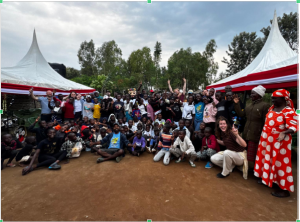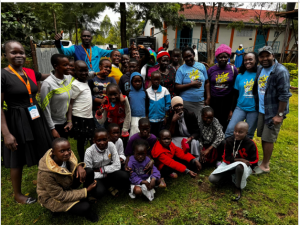Trust Is the Soul of Brave Collaborations!
Recently,  we hosted the Samata Collective Festival at the Rona Centre, our learning hub in rural Wagoma, Kenya. This global arts platform brought together partners from 5 nations to explore how creativity can transform digital inequalities. As co-PI, I began with little idea of what it truly meant to co-implement across five countries. It felt like a nut to crack—and indeed, we did.
we hosted the Samata Collective Festival at the Rona Centre, our learning hub in rural Wagoma, Kenya. This global arts platform brought together partners from 5 nations to explore how creativity can transform digital inequalities. As co-PI, I began with little idea of what it truly meant to co-implement across five countries. It felt like a nut to crack—and indeed, we did.
I felt both joy and unease as host. To welcome over 300 participants—artists, creatives and partners from Scotland, India, Britain, and Kenya—into our tiny gulf village was no small undertaking. Meeting in person for the first time, after nearly a year online, was thrilling, but it also carried the discomfort of navigating diversity and dynamics face-to-face. That tension became the heartbeat of our gathering.
I observed that the transition from online to offline was demanding. Online, words can carry the day. In person, silence, gestures, and lived realities often speak louder. For our community, art in the context of our widow centred project, needed contextual framing, translation, and meaning-making. So, for two days, I became not only host but also translator of meaning and intent—bridging practices for global partners while grounding the experience in our rural reality. It stretched me to the limit, yet it also grew me.
I did what leadership demanded. I insisted on safeguarding, leading to the adaptation of policies from each partner into a framework that our Samata community could own. It was imperfect at first—nearly unpopular, perhaps because of how our consultant framed the conversation—but it gave us a foundation. And at Rona Centre, we also held fast to a core principle: our community members are never spectators; they co-create.
And that was no small task, perhaps unfamiliar to our visiting partners.
In rural Nyanza pre-digital times, Siaya not exluded, art is “enjoyed” but not always respected as dignified labour in the same way teaching, fishing, or farming were.
Against this backdrop, we hosted this festival —to demystify that narrative and show art as a transformative tool for job creation and community change. Otherwise, for our people, it might have been easy to see the event as just a fun fair of colour and performance.
I knew the challenge: was how to invite them into what they viewed with suspicion—art, reduced to mere entertainment. By leaning on my storytelling skills, sharp power analysis, and long-held relationships, we turned doubt into joy, and their active participation transformed the gathering, and gave it its soul.
I have learnt that collaboration across borders needs more than goodwill. It requires trust, humility, and shared approaches. We, local leaders often risk being undermined by unequal access to resources and ‘knowledge’. In truth, what works elsewhere cannot simply be transplanted into rural soil without care, patience, and translation. And trust is the anchor that steadies global collaborations, giving it life, and meaningful impact.
The Samata gathering became a canvas of many colours. It was brave, new, and not without its frictions—but those very frictions made us braver. And it reaffirmed why Rona Foundation continues to stand as what ForumCiv, our Swedish Funder calls a non-traditional CSO: centering the human in the humanitarian, daring rural voices to lead, and now proving that even Africa’s—small villages can host global dreams.
From Wagoma, a reviving gulf village from the HIV pandemic, our hope is simple: that these lessons ripple outward, guiding other organizations—especially in the Global North—to build collaborations rooted not only in courage, but also in the soul of trust.
Roseline Orwa, a widow champion, and the Founder and Executive Director of the Rona Foundation, a Kenyan widow human rights organization. She tweets @roselineorwa


